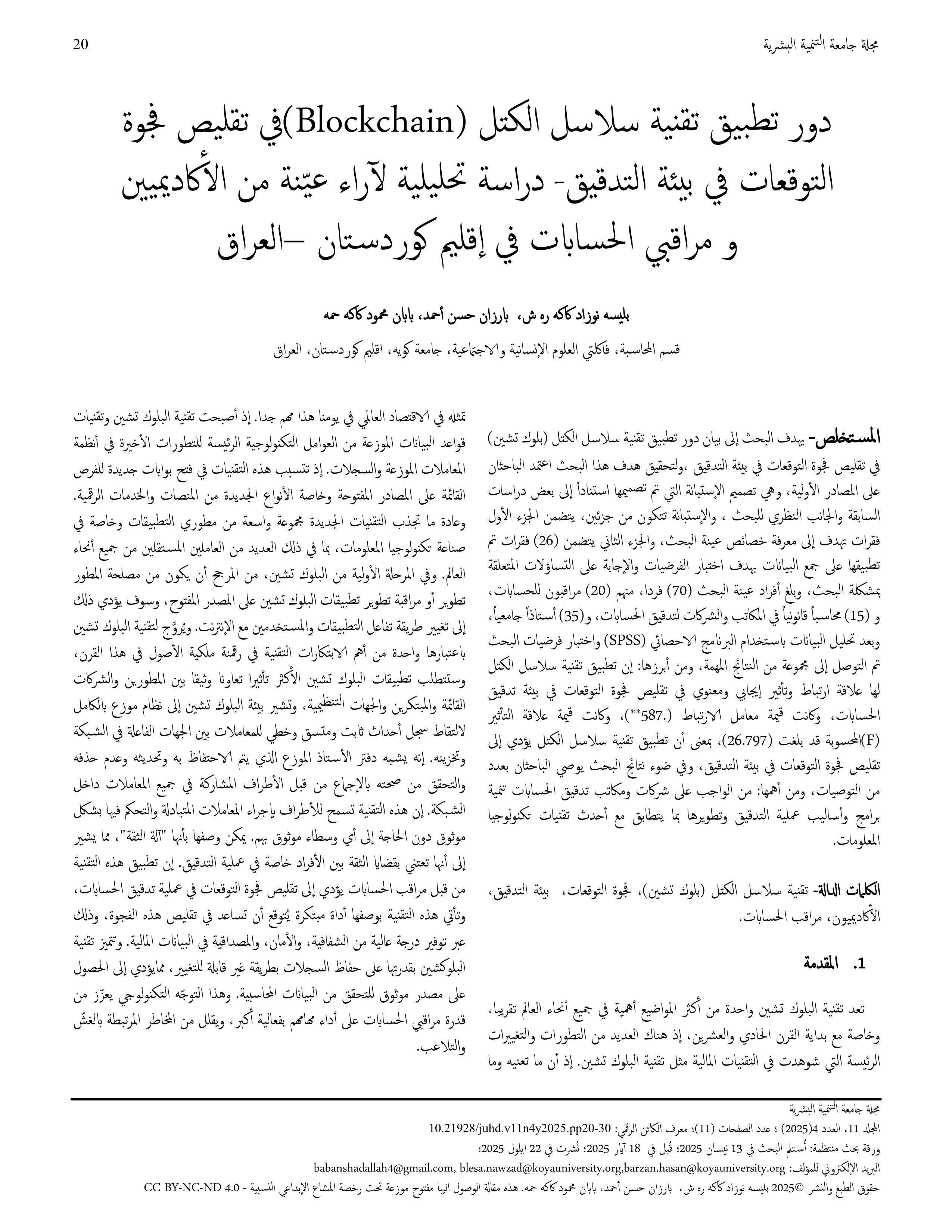The role of applying block chain technology in reducing the expectation gap in the audit environment - an analytical study of the opinions of a sample of academics and auditors in the Kurdistan Region - Iraq
DOI:
https://doi.org/10.21928/juhd.v11n4y2025.pp20-30Keywords:
Block chain technology, expectations gap, audit environment, academics, auditorAbstract
The research aims to demonstrate the role of applying block chain technology in reducing the expectations gap in the audit environment. To achieve the goal of this research, the researchers relied on primary sources, namely the design of the questionnaire, which was designed based on some previous studies and the theoretical aspect of the research. The questionnaire consists of two parts. The first part includes paragraphs aimed at knowing the characteristics of the research sample, and the second part includes (26) paragraphs that were applied to collect data with the aim of testing hypotheses and answering questions related to the research problem. The research sample members amounted to (70) individuals, including (20) auditors, (15) legal accountants in audit offices and companies, and (35) university professors. After analyzing the data using the statistical program (SPSS) and testing the research hypotheses, a set of important results were reached, the most prominent of which are: The application of block chain technology has a positive and significant correlation and impact in reducing the expectations gap in the audit environment. The value of the correlation coefficient was (.587**), and the calculated value of the impact relationship (F) was (15). (26,797), meaning that the application of block chain technology leads to reducing the expectation gap in the audit environment. In light of the research results, the researchers recommend a number of recommendations, the most important of which are: It is the duty of auditing companies and offices to develop and improve auditing process programs and methods in line with the latest information technology techniques.
References
بشير بكري عجيب بابكر. (2023). دور المراجعة المشتركة في الحد من فجوة التوقعات للمراجعة–دراسة ميدانية. مجلة العلوم الإقتصادية و الإدارية و القانونية، 7(3)، 81-98.
ذنون، ثانية اسماعيل، (2023)، مدى إدراك المحاسبين بتقنية البلوك تشين وتأثيرها على مهنة المحاسبة، مجلة العلمية الإدارية و الاقتصادية ، المجلد 19 ، عدد 1 .
ربيعة رمضان شابون، & د. ايناس ابوبكر الطيري. (2022). دراسة علاقة مدى معرفة المحاسبين بتقنية البلوك تشين وتوقعاتهم بأهميتها على المحاسبة-دراسة ميدانية. مجلة الدراسات الاقتصادية، 5(3)، 27-48.
صبيحة برزان العبيدي. (2016). العوامل التي تؤدي إلى حدوث فجوة التوقعات بين مستخدمي المعلومات المحاسبية وأداء المدققين الخارجيين وطرق تضييق تلك الفجوة. Journal of Baghdad College of Economic sciences University، (48).
علي، س. ا. م.، & سحر السيد محمود. (2021). آليات حوكمة الشركات ودورها في تضييق فجوة التوقعات في المراجعة (دراسة ميدانية على بيئة المراجعة فى جمهورية مصر العربية). المجلة العلمية لکلية التجارة (أسيوط)، 41(71)، 155-192.
محسن، محمد عبدالعزيز & حسين، تةرزة محمد. (2023)، دور توظيف تقنية سلسلة الكتل ( Block chain) في تعزيز كفاءة النظام الضريي وفقا لمؤشرات V.Tanzi ، مجلة قەڵای زانست العلمية ، المجلد 8 ،عدد 5، ٩٠٦-٩٣٠.
محمد ، گولالە عاصي & حمه أمين، عثمان عبدالقادر ،2020، أثر الإجراءات التحليلية على تقليص فجوة التوقعات في بيئة التدقيق دراسة استطلاعية لآراء عينة من الأكاديميين والمدققين الخارجيين في اقليم كوردستان/ العراق . المجلة العلمية لجامعة جيهان – السليمانية، المجلد 4 ، عدد2 ، pp.215-195.
مفيد ، عبداللاوى. (2014). فجوة التوقع في بیئة المراجعة بین المسببات وسُبل المعالجة. المجلة جامعة حمه لخضر، الوادى - الجزائر، 5(1)، 194-183.
نصير، م. م. ا.، & مبروک محمد السيد. (2023). إطار مقترح لاستخدام تكنولوجيا البلوك تشين في تطبيق المعاملة الضريبية للأنشطة الرقمية وصناعة المحتوى بمصلحة الضرائب المصرية. المجلة العلمية للدراسات والبحوث المالية والتجارية، 4(2)، 543-577.
يونس، ناصر، العسكري، فرج، الصداعي، & أبوبكر. (2022). أثر تطبيق تقنية سلسلة الكتل على الأداء المالي للمصارف الإسلامية الليبية (دراسة حالة المصرف الإسلامي الليبي)، المجلد 8، عدد 2.
English References:
Alawi، S. A. A.، Wadi، R. M. A.، & Kukreja، G. (2018). The determinants of audit expectation gap: An empirical study from Kingdom of Bahrain. Accounting and Finance Research، 7(3)، 54-66.
Al-saedi، M. O.، & Almaliki، O. J. (2023). The impact of applying blockchain technology in accounting and auditing. World Bulletin of Management and Law، 22، 136-142.
Anis، A. (2023). Blockchain in accounting and auditing: unveiling challenges and unleashing opportunities for digital transformation in Egypt. Journal of Humanities and Applied Social Sciences، 5(4)، 359-380.
ALSaqa، Z. H.، Hussein، A. I.، & Mahmood، S. M. (2019). The impact of blockchain on accounting information systems. Journal of Information Technology Management، 11(3)، 62-80.
Bonyuet، D. (2020). Overview and impact of blockchain on auditing. International Journal of Digital Accounting Research، 20، 31-43.
Humphrey، C. (1997). Debating audit expectations. Current issues in auditing، 3، 3-31.
Monroe، G. S.، & Woodliff، D. R. (1993). The effect of education on the audit expectation gap. Accounting & Finance، 33(1)، 61-78.
Olojede، P.، Erin، O.، Asiriuwa، O.، & Usman، M. (2020). Audit expectation gap: an empirical analysis. Future Business Journal، 6، 1-12.
Photikhina ، A.، and Ruimkim، I.، )2017(. Blockchain paradigm a new accounting Implications for credit risk management، Master thesis، Umeå School of Business and Economics.
Sarkar، S. (2018). Blockchain accounting the disruption ahead. The Management Accountant Journal، 73-78.
Alkafaji، B. K. A.، Dashtbayaz، M. L.، & Salehi، M. (2023). The impact of blockchain on the quality of accounting information: an Iraqi case study. Risks، 11(3)، 58.

Downloads
Published
How to Cite
Issue
Section
License
Copyright (c) 2025 Blesa Nawzad Kakarash, Barzan Hassan Ahmed, Baban Mahmood Kaka Hama

This work is licensed under a Creative Commons Attribution-NonCommercial-NoDerivatives 4.0 International License.


